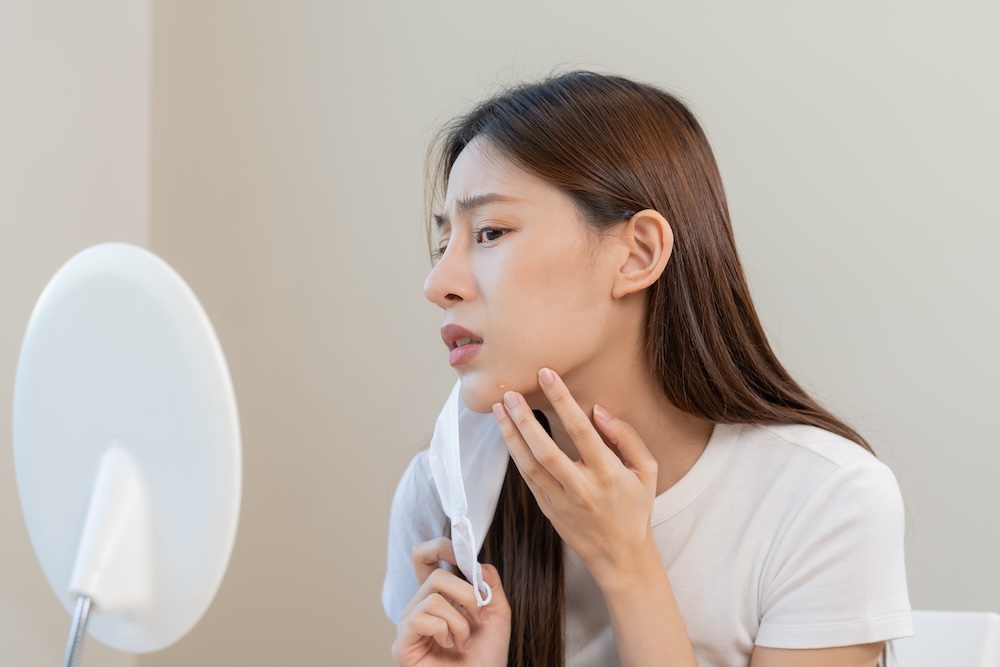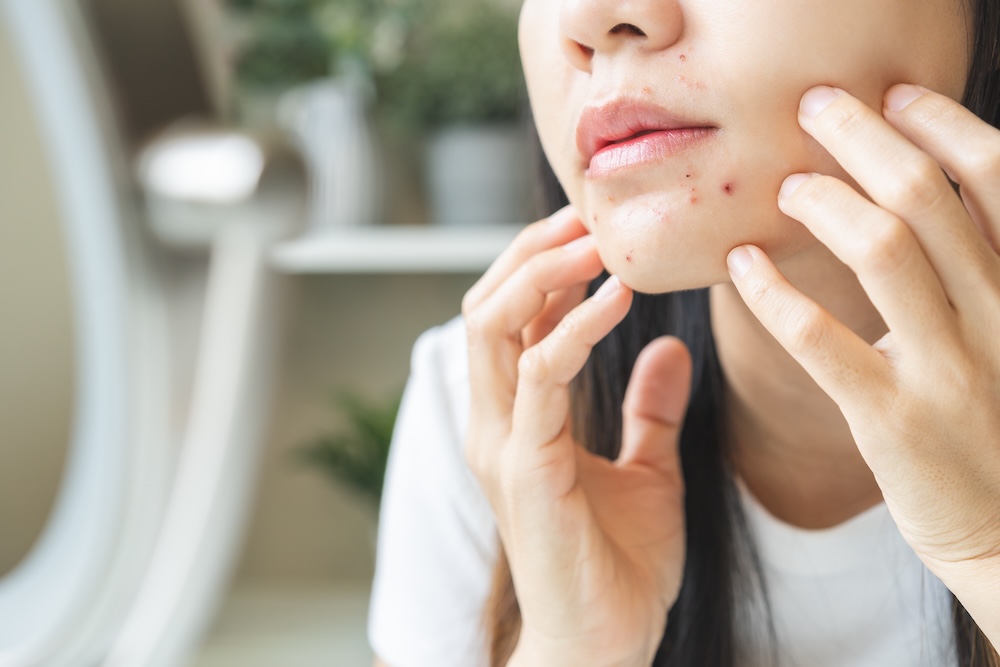A prevalent skin concern, acne can impact many people, regardless of age or gender. From those pesky pimples that pop up during puberty to the occasional breakouts that plague us as adults, acne can be a persistent source of frustration.
And of the many things we hear can cause acne, like dairy, skincare products, or hormonal imbalances, one that consistently comes up is makeup.
But does wearing makeup really cause acne, or is it just a scapegoat?
Understanding Acne: Causes and Types
But first, before determining if makeup is a culprit behind your breakouts, it’s important to understand what acne is in the first place.
Acne, a widespread skin condition, manifests in various forms, from minor blemishes like blackheads and whiteheads to more inflammatory lesions such as papules, pustules, and cysts.
Acne arises when hair follicles become blocked by a combination of sebum (an oily substance produced by the skin) and dead skin cells. This accumulation of debris within the follicle can trigger an inflammatory response within the follicle, ultimately resulting in the development of the characteristic bumps and blemishes associated with acne.
Several factors can contribute to acne development, including hormonal fluctuations, certain medications, dietary choices, and stress. Importantly, as mentioned, acne can affect individuals at any stage of life, not just during adolescence.
Exploring the Link Between Makeup and Acne
So, does makeup actually cause acne?
The answer isn’t quite so straightforward. While makeup itself doesn’t directly cause acne, it can certainly contribute to breakouts if not chosen and used carefully. How so, you ask?
For one, certain makeup products include ingredients that have the potential to clog pores, which, as we know, are key factors in acne development. This type of acne, triggered by cosmetic use, is often referred to as “acne cosmetica.”
Common culprits in makeup that can contribute to clogged pores include oils and silicones, often used for their smoothing and long-lasting properties. However, it’s important to remember that not all makeup is created equal. Non-comedogenic products, specifically formulated to avoid pore-clogging ingredients, can be a safer option for those with acne-prone skin.
Furthermore, the way makeup is used can also play a role in acne development. For instance, failing to remove makeup thoroughly at the end of the day can lead to the accumulation of dirt, oil, and makeup residue, providing a favourable habitat for bacteria, which in turn elevates the likelihood of breakouts.
Defining Comedogenic Products and Their Impact
So, how do you know which makeup products might be contributing to your breakouts? The answer lies in understanding comedogenicity.
Comedogenic products are those that have a tendency to clog pores. This can lead to the formation of blackheads and whiteheads, also known as comedones, which are the precursors to acne. Certain ingredients commonly found in makeup can contribute to this pore-clogging effect.
Some common comedogenic ingredients that can clog your pores include:
- Certain oils: Coconut oil, palm oil, and wheat germ oil.
- Isopropyl myristate and isopropyl palmitate: These are often used to give products a smooth and silky texture but can contribute to comedogenicity.
- Cetearyl and stearyl alcohol: While these alcohols act as emollients and stabilisers, they can also clog pores if not thoroughly removed.
- Thickening agents: Ingredients like cetyl acetate and acetylated lanolin alcohol can contribute to acne formation.
The Benefits of Non-Comedogenic Makeup for Skin Health
So, does this mean you can’t use makeup at all if you’re prone to acne? Not necessarily.
Non-comedogenic makeup is formulated to be less likely to clog pores, making it a safer option for those with acne-prone skin.
Unlike traditional makeup, which may contain pore-clogging ingredients like heavy oils and waxes, non-comedogenic makeup is designed to allow the skin to breathe.
Debunking Popular Myths About Makeup and Acne
Just like how there’s a common misconception that every makeup product causes acne (it doesn’t!), there are several myths surrounding makeup and its impact on our skin. Some of these common misconceptions include:
Myth #1: Makeup is a Primary Cause of Acne
One common myth is that makeup always causes acne. While it’s true that certain makeup products can exacerbate acne, it’s important to remember that makeup alone is not typically the sole culprit. This is because acne development is influenced by various factors, including hormonal fluctuations, genetics, stress levels, dietary choices, hygiene practices, and even certain medications.
Myth #2: All Makeup Products Have Similar Effects on the Skin
Another prevalent myth is that all makeup products are created equal and have the same effect on the skin. However, this is far from the truth, as different makeup products have varying formulations and ingredients, which can significantly impact their effects on the skin.
For instance, two foundations might appear similar but have different ingredient lists, leading to different effects on the skin. This variation highlights the importance of carefully selecting makeup products, especially for those with acne-prone skin.
Myth #3: Makeup Exacerbates Acne Conditions
While it’s true that certain types of makeup and improper application techniques can worsen acne, it’s not a universal rule. With the right product choices and proper usage, makeup can be enjoyed without aggravating existing acne.
And for those with acne-prone skin, choosing non-comedogenic and oil-free products is essential. Moreover, establishing a consistent skincare regimen that involves thorough cleansing and makeup removal is vital to prevent clogged pores and breakouts.
Essential Makeup Tips for Those With Acne-Prone Skin
If you’re prone to acne, choosing and applying makeup requires a bit more consideration. But don’t worry; it doesn’t mean you have to give up your favourite cosmetics altogether.
Consider these essential tips to help you enjoy makeup without worrying about whether it will make pimples worse:
Choosing the Right Makeup for Various Skin Types
When selecting makeup, especially for acne-prone skin, it’s essential to consider your unique skin type.
- Oily skin: If your skin tends to be oily, opt for oil-free and non-comedogenic products to prevent clogged pores. Look for labels that say “mattifying” or “shine control.” Mineral-based foundations and powders can also help absorb excess oil.
- Dry skin: If your skin is dry, choose makeup with hydrating or moisturising formulas. Cream-based products can help add moisture and prevent makeup from settling into dry patches. Avoid products with alcohol, as this can further dry out the skin.
- Combination skin: If you have combination skin, with some areas oily and others dry, you might need to use different products for different areas of your face. Use mattifying products on oily areas and hydrating ones on dry areas.
Best Practices for Makeup Application to Avoid Acne

How you apply your makeup can also impact your skin’s health.
- Use clean brushes and sponges: This helps prevent the transfer of bacteria and oils to your skin. Clean your brushes and sponges regularly to keep them hygienic.
- Apply light layers: Avoid applying heavy layers of makeup, as this can increase the risk of clogged pores. Start with a small amount and build up coverage gradually.
- Apply acne treatments before sunscreen or makeup: If you use acne treatments, apply them before sunscreen or makeup to allow them to penetrate the skin effectively. Consider using a Japan pimple cream like Hakubi White C Gel for targeted acne care. Pimple creams like these offer a targeted approach to tackling acne-related concerns. This specific pimple cream from Japan contains a carefully curated blend of ingredients, including Magnesium Ascorbyl Phosphate, designed to combat pimples effectively.
- Remove makeup thoroughly at the end of the day: This is crucial to prevent clogged pores and breakouts. To ensure your skin is completely free of makeup, use a gentle makeup remover followed by a thorough cleanse with your preferred cleanser.
Developing a Skincare Routine That Complements Makeup Use
A consistent skincare routine is essential, especially if you wear makeup regularly. This routine should include cleansing, toning, and moisturising, both morning and night.
And if you’re dealing with hyperpigmentation or uneven skin tone post-acne, consider incorporating Japanese whitening products into your routine. These products are formulated with ingredients that can potentially help brighten the skin and reduce the appearance of dark spots.



